What's New
12 August, 2020
Plenty on life’s menu for community-meal kingpin

Lawyer and mother-of-three Brianna Parkinson bounced back from a food-business disappointment to launch a social-meal project in Bayswater. She tells Helen Vause about sharing resources to help build community.
If you run into Brianna Parkinson, she could well have a box of apples under one arm and a wriggling puppy under the other. Or she might be headed off in her suit to tackle a gnarly legal dispute. By the end of the day she could be on a taxi-mum run.
But if it’s Wednesday morning, you’ll more than likely find her in the little kitchen at the Bayswater Bowling Club, with a bunch of volunteers peeling, chopping and stirring, cooking up delicious dinners and desserts for the community. That is the morning Brianna and her Kai 4 Communities crew make 100 or more meals that will be distributed to people in the area who are in need of some good kai and support.
Making and distributing the meals has been funded by the Devonport-Takapuna Local Board, and many of the ingredients are contributed by food rescuers, Kiwi Harvest.
Around 1500 of the weekly meals will be delivered before the current funding runs out and the scheme is re-evalutated.
It runs alongside the monthly Kaitahi Dinners that Parkinson established in Bayswater in 2017. This month, the 27th dinner will bring more than 100 local people to Bayswater School to share a meal in a popular community event for all comers.
The weekly dinners are a kind of Covid-19 response for the community, and may just be a “short-term hug”, says Parkinson.
The mother of three, businesswoman and lawyer dives into the community-cooking projects in a way that suggests her time and energy are limitless resources.
Parkinson is no stranger to hard work and juggling multiple demands. She grew up in the country, in Waiuku, south of Auckland, where her parents owned a knitwear business in which the whole family often pitched in to help out.
She remembers her first task in the knitwear factory, as a seven-year-old, was helping tweak leftover yarn. Many more holiday jobs followed in the factory and the local fields.
“One year, I remember we picked pumpkins for a grower near where we lived.” She recalls biking five kilometres on bumpy country roads to school and being part of a country community where everyone worked together. And if kids wanted pocket money they found ways to earn it.
For her high-school years, Parkinson was a border at a city school. Then she set her sights on the University of Auckland and a law degree.
She wanted a qualification that would put her right in the thick of the workings of the world, and give her the tools to help make a difference.
Alongside her studies, she was also a competitive cyclist, and met her husband- to-be Mike Kwok.
Over a 20-year legal career, Parkinson has worked for a couple of big law firms and as in-house counsel for Auckland Council.
She is an experienced litigator in resource management, environment and public law.
Parkinson has a keen commitment to public spaces and ensuring the creation or preservation of them through planning.
She was involved in wrangling the challenges in the development of the Wynyard Quarter on the Auckland waterfront, including issues of hazards, heritage, multi-use and public spaces. “Master-planning is the only logical way to go forward for urban growth,” she says.
By the time of the birth of her first daughter 16 years ago, Parkinson decided something had to give if she and Kwok were to have the family life she valued, so she cut back on her workload. When her second baby girl came 23 months later, she took time off and scaled down the work again, for a while.
With a two-year-old, and a young baby, she leapt into the commitment of hands-on early education at Narrow Neck Playcentre – and a serious spot of fundraising for the centre.
Parkinson had her hands full, but was hankering for a new challenge and decided to become a barrister, taking the scope of her professional life in a new direction.
The couple had a third little girl, and 46-year-old Parkinson recalls those chaotic early-childhood years with a laugh. “We were also ripping apart an old villa and renovating.”
A few years on, with the kids at school, the renovations done and more professional experience under her belt, Parkinson was struggling with some disillusionment around the city’s planning issues.
On a flight to Christchurch, a magazine story about backing local food production and eating local caught her eye. An idea formed and she was off, with full support from her husband, on a bold new adventure.
In 2017, Parkinson and Kwok opened the doors on the upmarket foodie destination store, The Little Village Grocer, in Devonport.
They poured in hours of work, planning and money to what they hoped would be the store of choice for discerning locals. But after four months of trading, Parkinson says they had to face the reality of the viability of the business and they shut the doors.
They reopened some months later as a café, which they sold in January of the following year.
It was possibly the toughest year of her life, she says. It was the collapse of a private dream fuelled by deeply held passions about how in an ideal world food should go from farmer to table.
“We are becoming more and more insular. This is about giving a little bit of aroha to the community.”
“I was absolutely gutted. Closing that business was a biggie for me.”
Parkinson may have been reeling with disappointment, but already had another scheme in her sights. Working with food waste and promoting social dining were on her radar and she found a way to be part of that.
In September 2017, she’d sourced food that would otherwise have been wasted and, with the help of volunteers, she pulled together Bayswater’s first Kaitahi Dinner.
“It was probably part of my healing process as I came to terms with what had happened to the business,” she says. “But the thing that drove me from the start was having a way of working with food waste. And the timing was absolutely right for me.
“There are a number of things these dinners are doing, apart from using food that would have otherwise been heading for the bin. They bring people together both on the night and in the preparations. They are a treat for families who otherwise couldn’t go out for dinner together. And they do help to address loneliness in communities.
“We are becoming more and more insular. This is about giving a little bit of aroha to the community. I strongly believe that if you share the resources, you are building community.
“And they are delicious meals that we’re providing,” she grins.
“There is always meat on the menu, and there is always ice cream. You should see the kids’ faces when they see the ice cream.”
The demands of the growing Kaitahi projects are high – and sometimes those food boxes are pretty heavy. But alongside this commitment, Parkinson works up to about 20 hours a week. Currently, she is co- counsel on a couple of prosecutions under the Resource Management Act, and she’s acting for others in environmental issues.
“For me it’s all about finding a balance, and that old thing about paying attention to self-care. I’ve learned I can flick the switch from one role to another pretty quickly. I never had ambitions to make partner in the firm or to become a judge all while raising a family.
“I don’t have any regrets about that.”

Please consider supporting The Devonport Flagstaff by clicking here:
